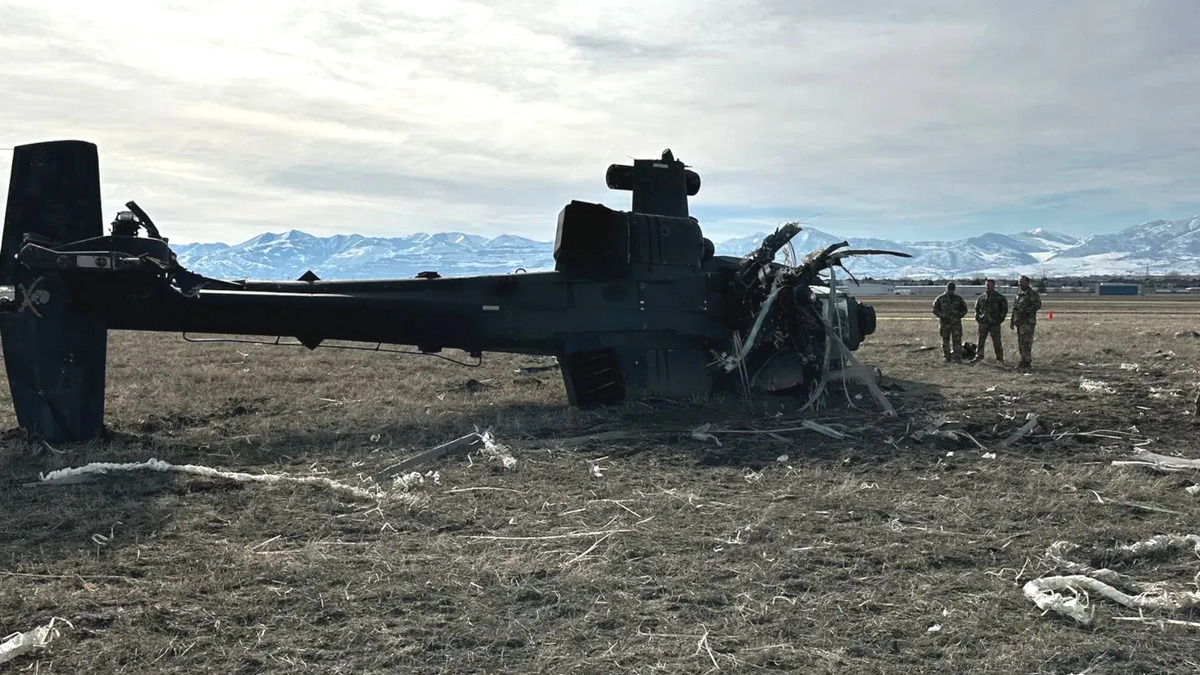A FOX 13 News investigation has claimed that an F-35 pilot, lacking the necessary qualifications to operate an Apache attack helicopter, was at the controls during a crash involving the Utah National Guard earlier this year.
The incident occurred on February 12 during an “orientation flight” intended to showcase the helicopter’s capabilities to a colonel from the Air Force Reserves.
The Apache attack helicopters involved belong to the Utah National Guard’s 1st Attack/Reconnaissance Battalion, 211th Aviation Regiment, also known as the “Air Pirates.”
This unit is known for its dual mission: destroying enemy forces through aerial firepower in federal missions and supporting homeland defense in state missions. Despite this unfortunate incident, the battalion has maintained a reputation for excellence over the years.
The report, obtained through a public records request, highlighted that the colonel’s experience with the Apache helicopter was limited. Before the flight, he had only about 35 minutes of simulator time.

The orientation flight itself lasted 90 minutes, during which the colonel attempted to hover and land the Apache at the West Jordan airport. According to the report, the chief warrant officer, who was also in the cockpit, had to take control of the helicopter during three unsuccessful landing attempts by the colonel.
On a fourth attempt, the situation took a dangerous turn. The report noted that the colonel, in a moment of panic and due to his unfamiliarity with helicopter flight controls, defaulted to his fixed-wing aircraft training.
He applied a downward movement, an action suitable for a jet but improper for a rotor-wing aircraft. As a result, the Apache helicopter spun and fell from approximately 10 feet above the ground before the chief warrant officer could regain control.
“In a moment of panic and due to his great unfamiliarity with the… helicopter flight controls,” an investigator wrote, “the [colonel] reverted to his fixed-wing… training and applied downward movement…This motion…was not the proper input in a [rotor wing] aircraft.”
The crash resulted in minor injuries for the warrant officer, but the colonel sustained more serious, though non-life-threatening injuries that required surgery and rehabilitation.
Orientation flights, like the one that ended in the crash, are not uncommon. A 2021 Army news release, for example, detailed an exercise where Apache pilots provided similar rides to Hungarian soldiers.
However, this incident underscores the major risks involved when pilots without proper qualifications are allowed to take control of aircraft outside their expertise.
Investigation Reveals Systemic Failure
In the Utah crash, investigators criticized the chief warrant officer for excessive confidence, which led to poor management of aircraft controls and inappropriate altitude decisions by an unqualified pilot.

The report also highlighted issues further up the chain of command, referencing a similar leadership failure observed in a 2022 crash involving two Utah National Guard helicopters at Snowbird Resort.
The investigators pointed out that commanders had not properly communicated and enforced standard operating procedures.
The report emphasized a need for better information flow from higher to subordinate units and personnel. The Utah National Guard did not respond to requests for comment on August 30.
The implications of the crash could extend across the US. The report suggested that the National Guard Bureau, a Pentagon office, should review the orientation flight procedures for Apache units.

Recent months have seen significant damage to the Apache helicopter’s reputation due to several crashes. The AH-64 Apache has been involved in multiple accidents, including a high-profile midair collision in Alaska in April 2023 that resulted in three fatalities.
In March of this year alone, two AH-64 Apaches crashed — one in Washington and another at Fort Carson, Colorado, with all crew members surviving.
In February 2024, two Apache crashes in Mississippi resulted in the deaths of two airmen, leading the Army National Guard to briefly ground the helicopters.
In August 2024, an AH-64 Apache crashed during routine training at Fort Novosel Army base, approximately 94 miles south of Montgomery, killing one person and injuring another.
Fort Novosel, previously known as Fort Rucker, has experienced other Apache crashes, including a 2022 incident near Ozark that injured two crew members.
In response to these incidents, Army officials announced in April that all aviation units would be required to undergo mandatory training to reinforce basic flying skills. The Apache helicopter, which has been in service for nearly four decades, has played a crucial role in various conflicts, including Operation Desert Storm in 1991 and the Afghanistan War.
- Contact the author at ashishmichel(at)gmail.com
- Follow EurAsian Times on Google News




